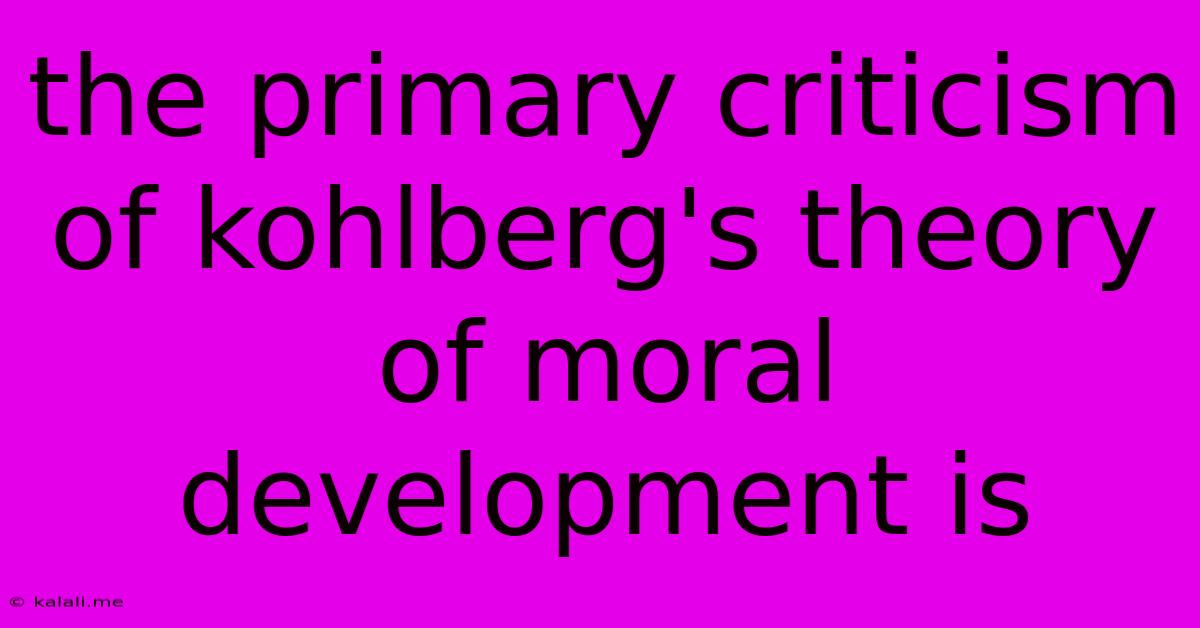The Primary Criticism Of Kohlberg's Theory Of Moral Development Is
Kalali
Jun 13, 2025 · 3 min read

Table of Contents
The Primary Criticism of Kohlberg's Theory of Moral Development: A Deep Dive
Kohlberg's theory of moral development, a cornerstone of psychological study, proposes that moral reasoning progresses through distinct stages. While influential, it's not without its critics. This article delves into the primary criticisms leveled against Kohlberg's work, exploring its limitations and the ongoing debates surrounding its validity. Understanding these criticisms is crucial for a nuanced appreciation of moral development and its assessment.
Kohlberg's theory, while insightful, faces significant challenges regarding its cultural bias, gender bias, and its overemphasis on reasoning over behavior. These criticisms, though varied, ultimately point to the complex and multifaceted nature of morality itself.
1. Cultural Bias: A Western-centric Perspective?
Perhaps the most prominent criticism of Kohlberg's theory is its inherent cultural bias. His research primarily focused on Western, male participants, leading to questions about the universality of his proposed stages. Critics argue that Kohlberg's framework might not accurately reflect moral reasoning in cultures that prioritize collectivism over individualism. For instance, concepts like social harmony and duty, which are central to many non-Western moral systems, may not be adequately captured by Kohlberg's stages. This suggests that the highest level of moral reasoning, as defined by Kohlberg, may be culturally specific rather than universally applicable. Different cultural contexts lead to different moral priorities, and the theory struggles to accommodate this diversity. Further research emphasizing cross-cultural comparisons is needed to fully understand the universality of moral development.
2. Gender Bias: Carol Gilligan's Challenge
Carol Gilligan's influential critique highlighted a significant gender bias within Kohlberg's framework. Gilligan argued that Kohlberg's stages primarily reflect a male-centric perspective on morality, emphasizing justice and abstract principles. She proposed that women often prioritize care and relationships, demonstrating a different, but equally valid, approach to moral decision-making. This critique underscores the importance of considering diverse perspectives on morality and recognizing the limitations of a single, universal model. The debate surrounding gender and moral reasoning continues to be a central discussion in the field, demonstrating the need for more inclusive and comprehensive theories of moral development.
3. Emphasis on Reasoning Over Behavior: The Gap Between Thought and Action
Another significant criticism is Kohlberg's emphasis on moral reasoning as the primary indicator of moral development. The theory doesn't always correlate strongly with actual moral behavior. Someone might score high on Kohlberg's stages, demonstrating advanced moral reasoning, yet still engage in unethical actions. This disconnect between cognitive understanding and real-world behavior weakens the predictive power of the theory. A more comprehensive theory needs to consider the interplay between cognitive reasoning, emotional factors, and social context in shaping moral behavior. The disconnect highlights the limitations of focusing solely on cognitive aspects of morality.
4. The Stages Themselves: Are They Truly Distinct and Sequential?
Some argue that Kohlberg's stages are not as distinct and sequential as he proposed. Individuals might exhibit reasoning from different stages in various situations. The rigid stage progression might be an oversimplification of the complex process of moral development, which is likely more fluid and context-dependent than the theory suggests. Further research is needed to refine the understanding of stage progression and the interplay between various levels of moral reasoning within individual decision-making.
Conclusion: A Legacy of Influence and Ongoing Debate
Despite these significant criticisms, Kohlberg's theory remains highly influential in the field of moral psychology. His work spurred considerable research and debate, leading to a deeper understanding of the complexities of moral development. While the theory may require refinements and modifications to address its limitations, its enduring legacy lies in its contribution to framing and investigating the intricate process of moral reasoning across diverse individuals and cultural contexts. Future research should focus on integrating the strengths of Kohlberg's theory with a more nuanced understanding of cultural variations, gender differences, and the interplay between thought and action in shaping moral behavior.
Latest Posts
Latest Posts
-
How Does Amoeba Capture Its Food
Jun 14, 2025
-
Which Term Refers To An Absence Of Government
Jun 14, 2025
-
What Gpa Do You Need To Get Into Howard
Jun 14, 2025
-
Match The Feature On The Map With Its Correct Description
Jun 14, 2025
-
Cal State Long Beach Average Gpa
Jun 14, 2025
Related Post
Thank you for visiting our website which covers about The Primary Criticism Of Kohlberg's Theory Of Moral Development Is . We hope the information provided has been useful to you. Feel free to contact us if you have any questions or need further assistance. See you next time and don't miss to bookmark.